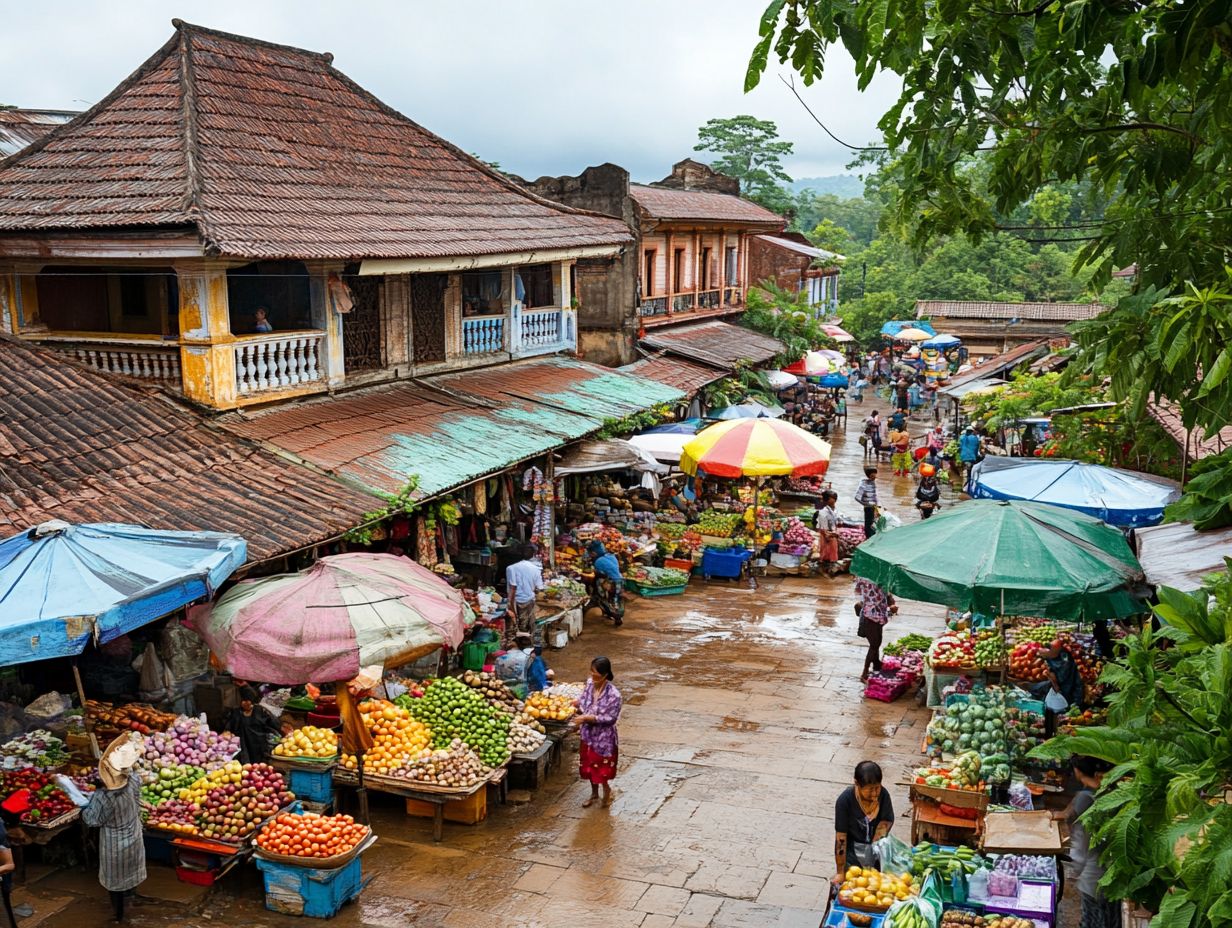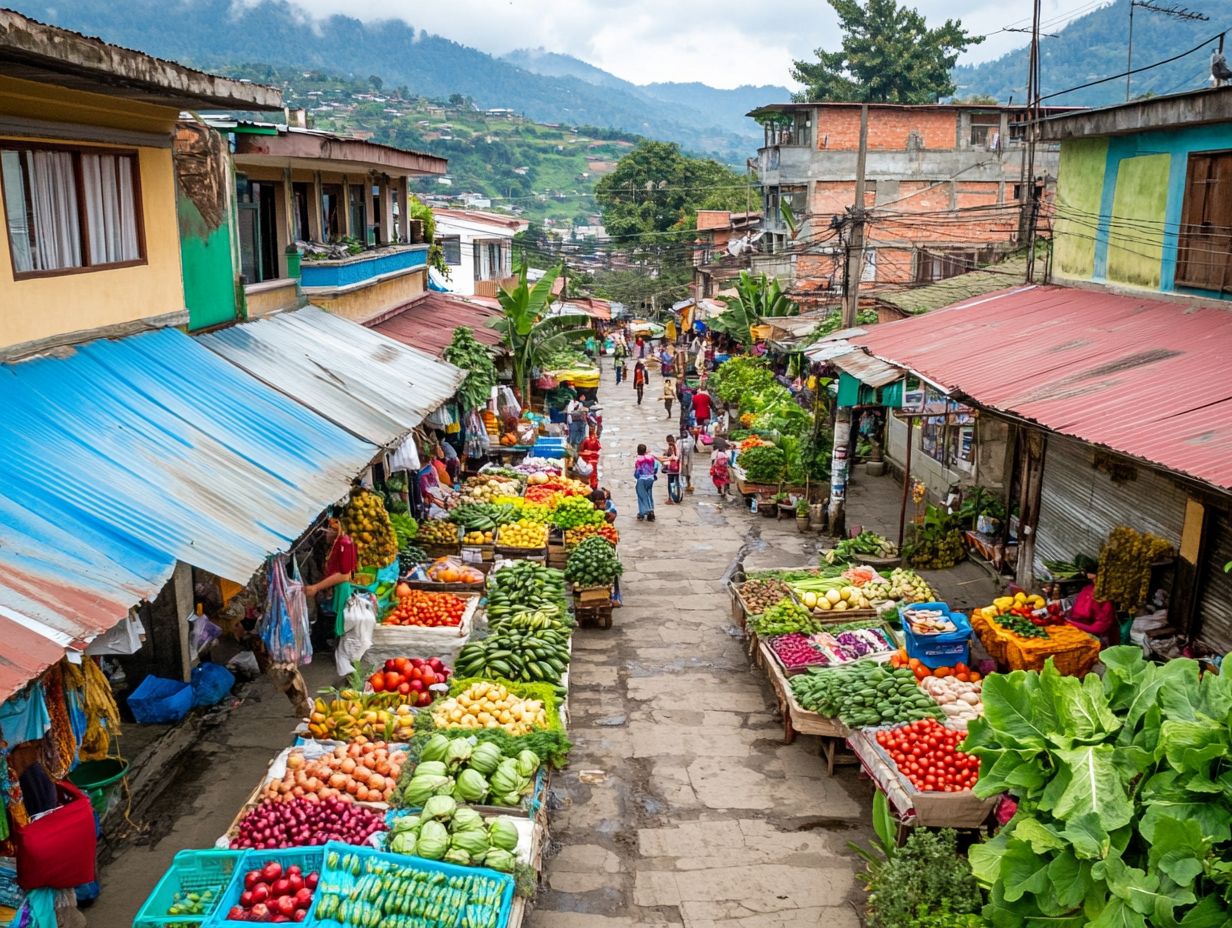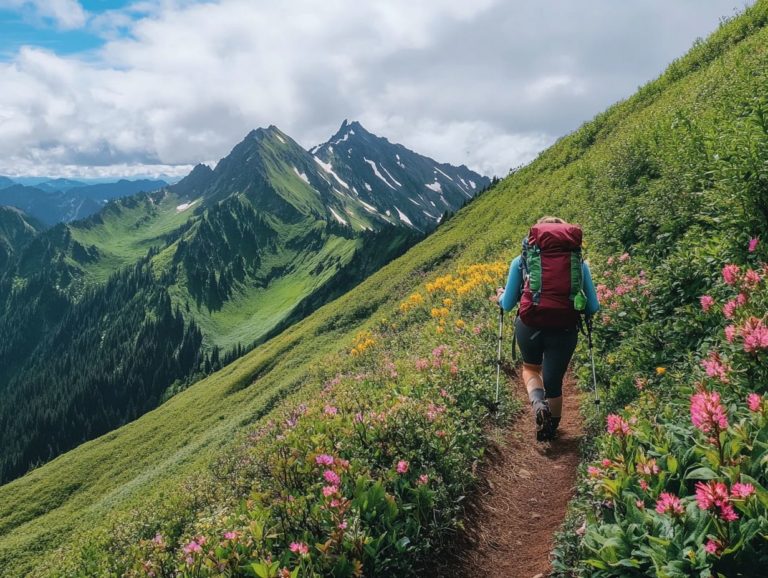7 Tips for Ethical Travel in Developing Countries
Traveling to developing countries offers a unique opportunity for enrichment, but it also carries the responsibility of being ethical and mindful.
This article presents essential tips to help you navigate your adventures while honoring local cultures and communities. From grasping local customs and supporting indigenous businesses to minimizing your environmental footprint, these guidelines empower you to travel with greater consciousness.
Discover how to engage with locals respectfully and make meaningful contributions to the places you visit ensuring that your travels create a lasting and positive impact.
Contents
- Key Takeaways:
- 1. Research the Culture and Customs
- 2. Support Local Businesses
- 3. Use Sustainable Transportation
- 4. Respect the Environment
- 5. Be Mindful of Your Interactions with Locals
- 6. Volunteer Responsibly
- 7. Educate Yourself on the Country’s History and Current Issues
- What Is Ethical Travel and Why Is It Important?
- What Are Some Common Issues with Unethical Travel?
- How Can Travelers Support the Local Community?
- What Are Some Ways to Reduce Your Environmental Impact While Traveling?
- How Can Travelers Avoid Cultural Appropriation?
- What Are Some Red Flags to Look Out for When Choosing a Volunteer Program?
- How Can Travelers Be More Mindful and Respectful in Their Interactions with Locals?
- Frequently Asked Questions
- What are the 7 tips for ethical travel in developing countries?
- Why is it important to research the culture of a developing country before visiting?
- How can I support local businesses while traveling?
- What can I do to minimize my environmental impact while traveling?
- How can I ensure my travel activities do not exploit animals or people?
- Why is being open-minded important while traveling?
Key Takeaways:

- Do your research on the culture and customs of the country you’re visiting to avoid using elements of another culture without permission or respect.
- Support local businesses and communities by purchasing goods and services from them.
- Choose sustainable transportation options, such as public transportation or walking, to reduce your environmental impact while traveling.
1. Research the Culture and Customs
Researching the culture and customs of your travel destination is essential for ethical travel. It fosters cultural sensitivity and enhances your ability to engage meaningfully with local communities.
By understanding their cultural norms and appreciating local delicacies, you can minimize the risk of cultural erosion and appropriation.
Taking the time to learn basic phrases through language apps like Duolingo opens up avenues for genuine conversation, bridging gaps between different cultures. This effort enriches your personal experiences and demonstrates respect for local languages and traditions.
Engaging with community-led initiatives, such as local markets or volunteer programs, allows you to contribute positively to the areas you visit. By diving into local customs, you ll make your journey not just authentic but unforgettable!
2. Support Local Businesses
Supporting local businesses is crucial for promoting travel that protects the environment and local cultures. It not only strengthens the local economy but also ensures that the benefits of tourism flow directly into the community, fostering ethical consumption and reducing economic privilege disparities.
When you make a conscious effort to dine at local markets or purchase handcrafted goods, you become an active participant in this vital ecosystem. By choosing local, you not only savor authentic regional flavors and unique artisanal products but also play a role in preserving traditional crafts and culinary practices.
This approach deepens your connection with the communities you visit, encouraging cultural exchange and understanding. By supporting local businesses, you contribute to job creation and resilience within the community, helping it thrive even in the face of global tourism challenges.
Ultimately, these small, thoughtful choices can lead to lasting positive impacts on the fabric of local cultures and economies.
3. Use Sustainable Transportation
Embracing sustainable transportation options while you travel is essential for minimizing your carbon footprint and advancing eco-friendly practices. By doing so, you not only travel responsibly but also contribute to carbon-neutral initiatives.
Exploring various modes such as biking, walking, and using public transport does wonders for your travel experience while significantly reducing the negative impacts of tourism on the environment.
For instance, research shows that cycling can cut greenhouse gas emissions by up to 60% compared to driving. Public transport serves as an effective means to move large groups of people simultaneously, alleviating road congestion and lowering pollution levels.
In cities that invest in pedestrian-friendly infrastructure, studies reveal that a mere 20% increase in foot traffic can invigorate local economies while protecting the natural landscape. This shift toward sustainable travel choices is pivotal in lessening the environmental impact of tourism, ensuring that breathtaking destinations remain vibrant for generations to come.
Let s make every trip count for our planet choose sustainable travel options today!
4. Respect the Environment
Respecting the environment while traveling is crucial for minimizing the environmental impact of tourism and supporting conservation efforts. By embracing eco travel practices, you can prioritize sustainability in every adventure.
By adopting practical strategies, you can make a significant contribution to preserving our planet’s delicate ecosystems. For instance, following the Leave No Trace principles guidelines for responsible outdoor ethics provides a solid framework that inspires outdoor enthusiasts like you to minimize your footprint in nature.
Engaging with local communities through conservation efforts enriches your travel experience. It also highlights the importance of protecting irreplaceable habitats.
Utilizing eco-friendly products, such as LifeStraw for clean drinking water, helps reduce reliance on single-use plastics. These proactive measures ensure that natural resources remain unspoiled for generations to come, allowing you to foster a deeper connection with the environment.
5. Be Mindful of Your Interactions with Locals

Being mindful of your interactions with locals is essential for ethical travel. This approach allows you to engage in cultural immersion respectfully while navigating wildlife interactions and obtaining photo consent, thereby honoring the dignity of the people and their culture.
Respectful communication is vital for building trust, especially in diverse cultural landscapes where nuances can significantly influence relationships. By understanding the various customs, gestures, and languages, you enrich your travel experience and reflect a genuine appreciation for local values.
Ethical considerations in photography are crucial; capturing images of individuals or sacred sites without permission can perpetuate stereotypes and disrespect cultural heritage.
By prioritizing mindful travel, you not only enhance your own journey but also cultivate meaningful connections with local communities. This fosters a mutual exchange of stories and traditions that benefits both visitors and residents alike.
6. Volunteer Responsibly
Volunteering responsibly stands as a cornerstone of ethical travel, requiring you to select organizations and projects that deliver genuine benefits to the community think reputable orphanages. Choose wisely your efforts can make a real difference in the community, so don’t overlook the impact of your choice.
It’s essential to remain vigilant about the potential impacts of tourism and to spot any red flags in volunteer opportunities. To ensure that the volunteer programs you consider truly align with community needs, conduct thorough research on the organizations that catch your interest.
This means diving into reviews from past volunteers, scrutinizing the organization s transparency regarding funding and outcomes, and getting a grasp on their sustainability practices.
Engaging directly with community members can unlock valuable insights into how these programs operate and whether they genuinely tackle local challenges. By staying alert to these factors, you can make a positive contribution and help avert the exploitative situations that often emerge from poorly managed volunteer tourism initiatives.
7. Educate Yourself on the Country’s History and Current Issues
Educating yourself on a country s history and its current issues is essential for responsible tourism. This not only enriches your cultural immersion but also ensures that your travel choices reflect considerations of social justice and economic privilege.
By diving into resources like Lonely Planet guides or local literature, you can gain a deeper understanding of the social and political issues unique to your destination. Additionally, exploring 7 tips for sustainable travel photography enhances your awareness of how to capture moments responsibly. Being aware of historical injustices or contemporary challenges gives you the power to engage more thoughtfully with locals and support businesses that uphold ethical practices.
This knowledge not only enriches your personal journey but also cultivates a profound respect for the communities you visit. Ultimately, being informed plays a pivotal role in sustainable tourism, enabling you to leave a positive impact while minimizing your footprint.
What Is Ethical Travel and Why Is It Important?
Ethical travel embodies the essence of responsible tourism. It guides you to minimize negative impacts on the environment and local communities while maximizing the benefits of your journeys. This approach is vital for conscious travelers like you, who seek to make informed choices and champion environmental awareness and social responsibility.
Ethical travel nurtures meaningful connections with local cultures. It also allows you to contribute positively to the economies you explore. By supporting local businesses and artisans, you help create long-lasting jobs and reduce dependence on mass tourism. For more insights on this, learn how to be a responsible tourist by being mindful of cultural norms and traditions, allowing you to immerse yourself more deeply in the communities you visit, resulting in richer and more authentic experiences.
Moreover, minimizing your carbon footprint through eco-friendly transportation and sustainable accommodations is essential for protecting natural habitats and combating wildlife exploitation. Your commitment makes travel more respectful and enriching for everyone. Embracing responsible travel practices enhances your travel experiences while supporting the local economy.
What Are Some Common Issues with Unethical Travel?
Common issues associated with unethical travel include wildlife exploitation, cultural erosion, and significant environmental impacts. These challenges can erode the integrity of destinations and harm local communities, contributing to the overall tourism impact on vulnerable local areas.
When you engage in harmful wildlife interactions like purchasing souvenirs made from endangered species or partaking in unethical animal tourism you endanger the very wildlife you wish to admire. You also contribute to the degradation of local ecosystems. Supporting businesses that overlook sustainability can lead to over-tourism, depletion of natural resources, and a loss of cultural heritage, ultimately undermining the destinations that attract you in the first place.
Such behavior can have lasting repercussions, affecting the livelihoods of local communities and alienating potential tourists who value responsible travel practices. In the long run, both the charm of these once-pristine locations and the welfare of their inhabitants may suffer, creating a cycle of degradation that benefits neither travelers nor the communities they visit.
How Can Travelers Support the Local Community?

You have the power to support local communities by diving into volunteer opportunities, such as:
- Volunteer at orphanages
- Shop at local markets
- Support community engagement projects
When you choose to donate directly to local charities, your contributions can make a genuine difference in the lives of residents. Opting to buy handmade crafts from local artisans not only helps preserve cultural traditions but also invigorates the local economy.
By participating in community-led tours, you gain an authentic glimpse into the local way of life, fostering a connection between you and the residents. These practices empower locals while enriching your travel experience, creating meaningful memories and championing sustainable tourism that benefits everyone involved.
Support ethical travel practices today! Your choices matter!
What Are Some Ways to Reduce Your Environmental Impact While Traveling?
Reducing your environmental impact while traveling is entirely achievable through a variety of sustainable practices. Consider choosing eco-friendly accommodations, utilizing reusable water bottles, minimizing waste, and opting for carbon-neutral travel options to effectively lower your carbon footprint.
Incorporating simple habits into your journey can dramatically decrease plastic consumption throughout your adventure. For instance, when you support local businesses that care for the environment, you make a real impact! This ensures that your vacation dollars contribute positively to the environmental well-being of your destination.
Engaging in activities like eco-tours or helping with conservation projects allows you to immerse yourself in the local culture while also aiding in environmental preservation. For example, following 7 tips for sustainable travel in Asia can guide your mindful decisions. These choices not only enhance your travel experience but also create a ripple effect, inspiring others to embrace eco-friendly practices and fostering a collective shift towards responsible tourism.
How Can Travelers Avoid Cultural Appropriation?
You can steer clear of cultural appropriation taking elements from a culture without understanding or respecting their significance by embracing cultural sensitivity and following travel ethics. This ensures that you engage respectfully with local traditions while avoiding the exploitation of cultural symbols and practices, and better understanding local cultural norms.
A smart strategy is to invest time in learning about the cultural histories of the destinations you visit. By grasping the significance behind local customs and practices, you can sidestep stereotypical representations that often lead to misunderstandings.
For example, before diving into a traditional dance or ceremony, always seek permission from local leaders or community members. This not only shows respect but also reflects a genuine interest in their culture.
You can also engage mindfully by supporting local artisans and businesses, fostering authentic interactions that honor the creativity and heritage of the community.
What Are Some Red Flags to Look Out for When Choosing a Volunteer Program?
When selecting a volunteer program, look for red flags, such as those that prioritize profit over genuine community benefits, lack transparency, or fail to provide adequate support for volunteers. Programs that support poverty alleviation and promote wealthy interests should be prioritized.
These warning signs often indicate underlying issues within organizations that may not genuinely prioritize the community’s best interests. It’s essential for you to conduct thorough research before committing to any program. This includes seeking testimonials from past participants, verifying the organization s non-profit status, and understanding how funds are allocated.
Assessing whether the project aligns with the community’s needs, rather than imposing external solutions, will help ensure that your initiative is ethical. By being diligent and discerning in your selection of volunteer opportunities, you can contribute in a way that truly gives power to local communities and fosters sustainable change! For guidance, consider exploring the ethics of volunteer travel. Choose wisely, and empower communities while making a difference!
How Can Travelers Be More Mindful and Respectful in Their Interactions with Locals?
You can cultivate mindful and respectful interactions with locals by being attuned to cultural norms, seeking photo consent, and engaging in active listening listening closely to understand others to foster genuine cultural immersion while also acknowledging the impact of digital nomads in the local setting.
Inquiring about local traditions for instance, asking if there are specific etiquette rules when dining or attending events demonstrates your sincere interest in the community. Understanding the significance of removing your shoes before entering a home or picking up a few basic phrases in the local language can go a long way in creating a warmer rapport.
Avoid intrusive behaviors like loud conversations or disruptive actions in tranquil settings to help maintain harmony. These thoughtfully executed practices not only enhance your travel experience but also leave a lasting positive impression on both you and the communities you visit.
Frequently Asked Questions

What are the 7 tips for ethical travel in developing countries?
The 7 tips for ethical travel are:
- Research local culture and customs.
- Respect local traditions.
- Support local businesses.
- Reduce your environmental impact.
- Avoid activities that exploit animals or people.
- Learn basic local phrases.
- Stay open-minded and flexible.
Why is it important to research the culture of a developing country before visiting?
Researching local culture is vital. It helps you understand and respect the way of life, preventing unintentional offenses.
How can I support local businesses while traveling?
Support local businesses by:
- Staying in locally owned places.
- Eating at local restaurants.
- Buying souvenirs from local markets.
These actions help the economy.
What can I do to minimize my environmental impact while traveling?
Minimize your impact by:
- Reducing plastic use.
- Conserving water.
- Joining eco-friendly tours.
Support local conservation efforts as well.
How can I ensure my travel activities do not exploit animals or people?
Avoid attractions that exploit animals, such as elephant rides. Research volunteering opportunities to ensure they are ethical and support vulnerable communities.
Why is being open-minded important while traveling?
Being open-minded helps you immerse yourself in the culture and adapt to unexpected challenges. This attitude enriches your travel experience.






